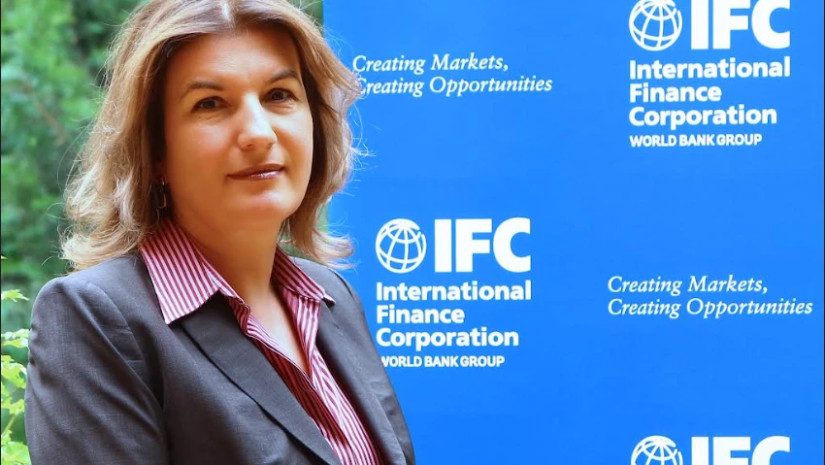Ivana Fernandes Duarte, IFC's Regional Manager for the South Caucasus
Imagine a world without dictionaries, creating mayhem with no universal template to communicate and understand each other. Drawing a parallel, sustainable finance development—a comprehensible approach to improve the social, economic, and environmental performance of the financial system—faces similar challenges. To start with, how do we define ‘sustainable?’
With no common description or classification system, akin to a lexicon, we need a green taxonomy—a standardized definition of investments or loans that qualify as ‘sustainable.’ With the lack of clarity long posing a barrier to scaling up sustainable finance, a sustainable finance taxonomy can help drive capital more efficiently toward priority sustainable projects.
A well-defined and structured sustainable finance taxonomy can inspire confidence in investors, allowing them to better align their efforts and incentives to sustainability goals, thereby preventing greenwashing. This is important because if there are no formally agreed-upon definitions, market actors can introduce their own. This can lead to lack of comparability, reliability, accountability, and higher transaction costs. A national sustainable finance taxonomy is further useful to provide guidance to the overall financial market.
The broad strategic goal of a sustainable finance taxonomy is to ensure a future economy that is sustainable. With the COVID-19 pandemic wreaking havoc across the world, now during the post-pandemic rebuilding period addressing social, environmental as well as climate change issues has never been so important to ensure a resilient growth trajectory and recovery.
Moving forward, we need public policies and policy reforms that can help mobilize finance for green, stable, and inclusive economic growth. This is where the financial system can play a key role because sustainable development requires sustainable financing, which according to the European Commission, is about two urgent imperatives. First, it involves channeling more finance to sustainable and inclusive growth by funding society’s long-term needs; and second, strengthening financial stability by incorporating Environmental, Social and Governance (ESG) factors into investment decision-making.
Taxonomies that are aligned with global definitions facilitate cross-border investments. However, by aligning with local requirements, a sustainable finance taxonomy can help local institutions contribute to sustainability goals. With this in mind, the National Bank of Georgia has developed a Sustainable Finance Taxonomy for the country.
The Taxonomy, covering both green and social aspects, provides clarity on the projects, assets and sectors that can be labelled green, social, climate-friendly, and sustainable, thereby positioning Georgia for the growing global market in sustainable investments.
Georgia’s geographical location and natural conditions make it particularly vulnerable to climate change. Increased frequency of natural hazards and other changes such as increasing temperatures result in substantial economic losses, especially in sectors like agriculture, forestry, tourism, and health care. These factors present challenges that are specific in nature for a small developing economy like Georgia, and hence the need for a local context.
A national sustainable finance taxonomy can be instrumental in redirecting financial flows, while helping address Georgia’s market specifics better. This, certainly, will be based on objectives that resonate with the country’s overall sustainable development agenda.
The Taxonomy builds upon good international practices and is adapted to local context. It was developed with support from the International Financial Corporation (IFC), in partnership with the Austrian Federal Ministry of Finance and the Swiss State Secretariat for Economic Affairs SECO, and the IFC-facilitated Sustainable Banking and Finance Network (SBFN), As part of Georgia’s Sustainable Finance Roadmap—also created with IFC support back in April 2019—it is an essential prerequisite for its successful implementation. Outlining an action plan for the next four years, the Roadmap aims to increase awareness, drive more capital flows to achieve a green and socially inclusive economy, and ensure greater market discipline through minimum ESG disclosure requirements for financial institutions and corporations, among others.
The National Bank of Georgia, a member of SBFN since 2017 and a Co-Chair of the SBFN Data and Disclosure Working Group, has been playing a proactive role in strengthening the country's sustainable finance efforts. Given the critical role of central banks to help the finance sector manage ESG risks and unlock new investment and lending opportunities, it launched the “ESG Reporting and Disclosure Principles” in 2020 with support from the Organization for Economic Co-operation and Development and IFC. These principles require commercial banks to conduct ESG reporting and disclosure in sync with international good practices. The Corporate Governance Code for Commercial Banks, also developed with IFC support, requires banks to give due consideration to ESG matters. To ensure that banks properly address environmental and social aspects in their operations, the National Bank of Georgia has also started the development of ESG Risk Management Guidelines for banks. A separate framework for issuers, a green, social, and sustainable bond framework, is also planned.
As an important step to Georgia’s greener future, we particularly welcome the first green bond issuance in the country placed recently by Georgian Renewable Power Operations, an affiliate of Georgia Capital, a leading investment management company. The landmark transaction and IFC's anchor subscription is expected to catalyze further issuances of green bonds and other sustainable finance instruments, spurring the capital market development, critical amid the uncertainty caused by the war in Ukraine, and its impact on the regional energy security.
At a time when nations are reeling under the social and economic consequences of the pandemic and volatility, Georgia’s Sustainable Finance Taxonomy is expected to enhance clarity for all those engaging in sustainable finance activities, offering a timely pathway to a more resilient future.
















